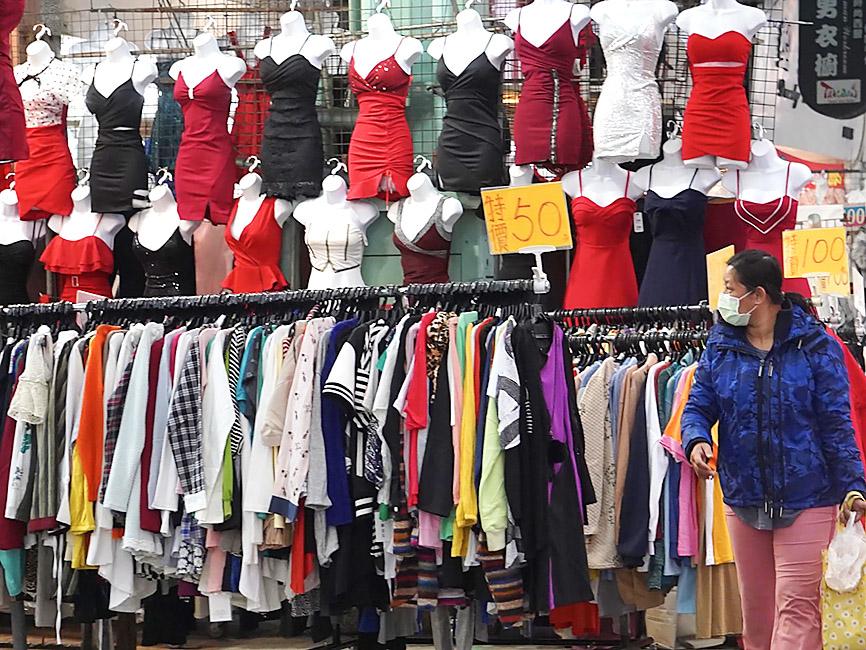The government’s business climate monitor signaled “yellow-red” for a second straight month in January, as strong demand for electronic and non-technology products ramped up business at local suppliers, the National Development Council said yesterday.
The gauge gained three points to 37, the highest in a decade, NDC research director Wu Ming-huei (吳明蕙) said, adding that the reading is only 1 point away from “overheating,” which might happen later this quarter in light of improving economic barometers.
“The demand and production fronts are gathering momentum across tech and non-tech sectors, as the economic landscape brightens at home and abroad,” Wu said.

Photo: CNA
The council uses a five-color system to portray the nation’s economic picture, with “green” indicating steady growth, “red” suggesting overheating and “blue” signaling a recession. Dual colors indicate a transition toward a recession or a boom.
Wu said that the gauge might in the next few months turn “red,” as the Directorate-General of Budget, Accounting and Statistics last month projected double-digit percentage increases for exports through the first half of this year, partly due to a low base last year.
Wu said that the “yellow-red” signal was due to frontloading demand ahead of the Lunar New Year holiday, when most Taiwanese companies took one week off.
That explained why exports and imports of electronics and machinery equipment were upgraded from “green” to “yellow-red,” the council said.
Meanwhile, revenue measures for wholesale, retail and restaurant operators turned from “yellow-red” to “red,” it said.
The positive trend is to continue as COVID-19 vaccines are more widely available, Wu said.
However, the public health crisis remains the biggest uncertainty, he added.
The index of leading indicators, which predicts the economic situation for the following six months, grew 0.78 percent to 107.07, as almost all subindices registered positive cyclical movements except the index on new construction floor space, the council said.
The US government is planning a new stimulus package of US$1.9 trillion that would help people and firms in the US affected by the pandemic and facilitate the country’s economic recovery, Wu said, adding that Taiwanese exports would likely benefit from that.
The index of coincident indicators, which reflects the current economic state, grew 1.07 percent to 105.5, as all of its seven measures increased, the council said.
Local tech firms would continue to benefit from ongoing global shortages of electronic and vehicle parts, Wu said.

Taiwan Semiconductor Manufacturing Co (TSMC, 台積電) last week recorded an increase in the number of shareholders to the highest in almost eight months, despite its share price falling 3.38 percent from the previous week, Taiwan Stock Exchange data released on Saturday showed. As of Friday, TSMC had 1.88 million shareholders, the most since the week of April 25 and an increase of 31,870 from the previous week, the data showed. The number of shareholders jumped despite a drop of NT$50 (US$1.59), or 3.38 percent, in TSMC’s share price from a week earlier to NT$1,430, as investors took profits from their earlier gains

In a high-security Shenzhen laboratory, Chinese scientists have built what Washington has spent years trying to prevent: a prototype of a machine capable of producing the cutting-edge semiconductor chips that power artificial intelligence (AI), smartphones and weapons central to Western military dominance, Reuters has learned. Completed early this year and undergoing testing, the prototype fills nearly an entire factory floor. It was built by a team of former engineers from Dutch semiconductor giant ASML who reverse-engineered the company’s extreme ultraviolet lithography (EUV) machines, according to two people with knowledge of the project. EUV machines sit at the heart of a technological Cold

AI TALENT: No financial details were released about the deal, in which top Groq executives, including its CEO, would join Nvidia to help advance the technology Nvidia Corp has agreed to a licensing deal with artificial intelligence (AI) start-up Groq, furthering its investments in companies connected to the AI boom and gaining the right to add a new type of technology to its products. The world’s largest publicly traded company has paid for the right to use Groq’s technology and is to integrate its chip design into future products. Some of the start-up’s executives are leaving to join Nvidia to help with that effort, the companies said. Groq would continue as an independent company with a new chief executive, it said on Wednesday in a post on its Web

CHINA RIVAL: The chips are positioned to compete with Nvidia’s Hopper and Blackwell products and would enable clusters connecting more than 100,000 chips Moore Threads Technology Co (摩爾線程) introduced a new generation of chips aimed at reducing artificial intelligence (AI) developers’ dependence on Nvidia Corp’s hardware, just weeks after pulling off one of the most successful Chinese initial public offerings (IPOs) in years. “These products will significantly enhance world-class computing speed and capabilities that all developers aspire to,” Moore Threads CEO Zhang Jianzhong (張建中), a former Nvidia executive, said on Saturday at a company event in Beijing. “We hope they can meet the needs of more developers in China so that you no longer need to wait for advanced foreign products.” Chinese chipmakers are in